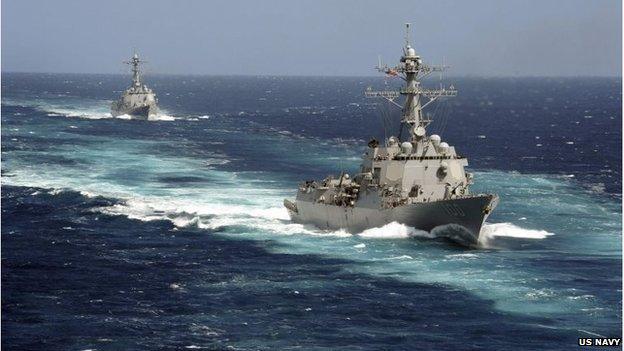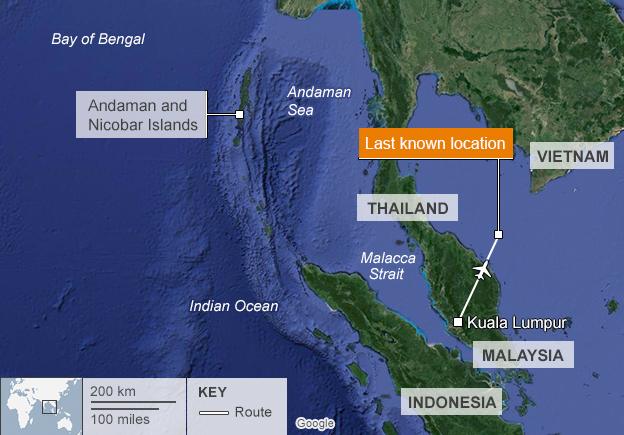Malaysia plane: Indian Ocean search for missing jet
- Published
Rupert Wingfield-Hayes travels over a search area near Penang
The US has sent surveillance teams to the Indian Ocean to help search for the missing Malaysian plane, after claims emerged that it may have flown for longer than investigators had thought.
Unnamed officials said the plane sent signals to satellites for up to five hours after its apparent disappearance.
However, investigators said the data were not conclusive and Malaysia refused to comment on the claims.
Flight MH370 vanished last Saturday with 239 people on board.
The plane, which was flying from Kuala Lumpur to Beijing, last made contact with air traffic control over the South China Sea to the east of Malaysia.
But several US media reports on Thursday cited unnamed officials as saying that the Boeing 777 was "pinging" satellites for hours after its last contact with air-traffic controllers.
That led searchers to believe the plane could have flown more than 1,600 km (1,000 miles) beyond its last confirmed radar sighting.
The US, which is one of a number of countries helping in the search for the plane, has now sent a navy destroyer and a sophisticated surveillance aircraft to the Indian Ocean, hundreds of miles west of Malaysia.
The Indian navy, air force and coast guard are also now assisting after a request for help from the Malaysian government.
The BBC's Jonathan Head in Kuala Lumpur says there have already been a number of false leads in the search for the missing plane.
However, he says the latest claims are being taken seriously by the US.
Reuters news agency later quoted unnamed sources close to the Malaysian investigation as saying that an unidentified aircraft had been tracked by radar flying north-west of Malaysia on Saturday.
The sources said investigators now suspected it was the missing plane.

Chinese relatives of the missing continue to wait for information at a hotel in Beijing

The US is sending the destroyer USS Kidd to the Indian Ocean

Malaysians are being urged to pray for the passengers and crew
White House spokesman Jay Carney confirmed that US teams were shifting their focus to the Indian Ocean because of "new information", but he gave no further details.
Malaysia's acting transport minister Hishammuddin Hussein said in a news conference that the search area was expanding both east and west of the Malaysian peninsula.
He said he was aware of the claims about satellite data, but he would not comment on any claims unless the information had been "corroborated by the relevant authorities".
India has military radar installations in the Andaman Islands with a range stretching well beyond the area where some believe the jet may have come down.
It is thought that they would have picked up anything the size of a commercial jet.
Some 153 of the passengers on board the Malaysia Airlines plane were Chinese, and Beijing has been putting pressure on Malaysia to intensify its search.
Earlier this week, Chinese officials released satellite pictures of debris in the South China Sea.
Hishammuddin Hussein said the images were not connected to Flight MH370's disappearance.
He said the Chinese embassy in Kuala Lumpur had told Malaysian authorities that the release of the pictures was a "mistake".
Hishammuddin Hussein: "A normal investigation becomes narrower with time...but this is not a normal investigation"
But Chinese state TV said a warship was continuing to search for the debris and suggested that Malaysia had been unable to analyse the pictures properly.
Meanwhile, a Chinese research institute on Friday said it had found evidence of a "sea floor event" some 90 minutes after the plane disappeared.
The seismology research group at the University of Science and Technology of China said it happened 116 km north-east of the last point of contact of the plane, in an area not known for seismic activity, according to state media.
The research group said the vibrations could have been caused by the plane plunging into the sea.
Marine geologist Dave Long from the British Geological Survey told the BBC that the energy released by a plane hitting the ocean would be rapidly dissipated in the water.
He said any device picking up such small movements would have to be very sensitive and incredibly close to the impact, meaning that search teams would now know exactly where to look for the debris.
